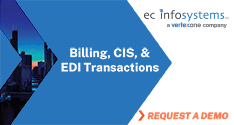|
|
|
|
|
Texas PUC Staff File Memo On Process Retail Providers Shall Use To Distribute Securitization Bond Proceeds, Reporting & Compliance Requirements
The following story is brought free of charge to readers by EC Infosystems, the exclusive EDI provider of EnergyChoiceMatters.com
Staff of the Texas PUC filed a memo outlining, among other things, how retail electric providers shall distribute proceeds from the winter storm Uri bond securitization, including treatment for former customers, and requirements for compliance reporting (Docket 52710)
ERCOT expects to begin distributing debt obligation bond proceeds on June 22,2022. Staff's memo describes the processes that will be used to ensure compliance with the Commission's Debt Obligation Order and PURA Chapter 39, Subchapter N.
ERCOT will distribute debt obligation bond proceeds to LSEs in accordance with ERCOT's Calculation of Load Ratio Share and Total Exposure (Proceeds Allocation Table), as set forth in a prior PUC order, by remitting each identified LSE's share of proceeds to its current QSE. ERCOT will also issue a market notice to all market participants once it has begun distributing the subchapter N bond proceeds. However, if at the time of distribution, an identified LSE is no longer a wholesale market participant, or failed to timely file a verification of its exposure in Project No. 52364, ERCOT will hold any such proceeds in a segregated account pending an order from the Commission directing the disposition of such proceeds.
Within fourteen days of ERCOT's market notice, each LSE must submit to ERCOT a signed attestation in which the LSE:
a. confirms that it has received from its QSE the correct amount of debt obligation bond proceeds;
b. specifies the total amount of proceeds that the LSE will use to refund or credit its retail customers for qualifying costs its customers have already paid or would otherwise be obligated to pay;
c. specifies the total amount of proceeds that the LSE will use to fulfill payment obligations to third-party entities that provided financing to the LSE to pay its qualifying costs;
d. specifies the total amount of proceeds that the LSE will use to reimburse itself for the use of its cash on hand to pay qualifying costs;
e. specifies the total amount of any excess receipts that were or will be returned to ERCOT;
f. attests that the LSE will maintain all debt obligation bond proceeds in a segregated account for the duration of the distribution process; and
g. attests that the LSE will only use the proceeds in accordance with the law and the Debt Obligation Order.
Within 30 days after its receipt of debt obligation bond proceeds, each LSE that receives proceeds must file in Project No. 53710 a distribution plan that specifies the estimated timeline to complete disposition of its debt obligation bond proceeds, which must not exceed 90 days from its receipt of the debt obligation bond proceeds.
By November 15, 2022, each LSE must file in Project No. 53710 an initial status report containing:
a. the actual dollar amount that the LSE refunded to its retail customers for qualifying costs;
b. the actual dollar amount that the LSE used to offset amounts owed by its retail customers for qualifying costs;
c. the actual dollar amount that the LSE used to fulfill payment obligations to third-party entities directly related to qualifying costs;
d. the actual dollar amount the LSE used to reimburse itself for the use of its cash on hand to pay qualifying costs;
e. the actual dollar amount of excess proceeds that have been remitted to ERCOT under PURA § 39.653(e); and
f. any amounts that are left to be distributed, and the reasons why the amounts have yet to be distributed.
If an LSE's initial status report contains any amount under paragraph (f) above, the LSE must file in Project No. 53710 a quarterly status report. Each quarterly status report must contain the same information as the initial status report with updated amounts until the earlier of: the amount in paragraph (f) is zero, or November 15, 2023, including a description of the steps that have been taken to locate and issue refunds to any remaining retail customers.
If on November 15, 2023, the LSE has not distributed all of its debt obligation bond proceeds, the LSE must file a final status report containing a detailed explanation of the reasons why it was unable to distribute all of its debt obligation bond proceeds, and concurrently remit the remaining funds to ERCOT under PURA § 39.653(e).
To effectuate PURA's provisions, Staff said that the use of debt obligation bond proceeds must utilize the following order of priority:
1. Refunds or offsets to an LSE's retail customers that paid or were obligated to pay qualifying costs. If a load-serving entity is not allocated 100% of its total exposure, any refunds or adjustments to retail customer invoices must be made in an amount that is not less than an amount that is proportionate to the percentage of the load-serving entity's total exposure that was allocated to that load-serving entity.
2. Fulfilment [sic] of payment obligations to third-party entities that financed payment of the qualifying costs.
3. Reimbursement to the LSE for its payment of qualifying Costs.
"A customer that is eligible to receive a refund of amounts paid for qualifying costs may have switched LSEs or moved out of Texas after paying the qualifying costs. An LSE must use reasonable effort to locate and issue refunds to such customers. However, if it is unable to issue refunds to all impacted customers before November 15, 2023, the LSE must remit all remaining debt obligation bond proceeds to ERCOT, and provide in its final status report a detailed description of all actions taken to issue refunds to such customers," Staff said
Staff noted that, "The Commission is authorized under PURA § 39.661 to use any method of enforcement available under PURA Chapters 15 and 39, including revocation of certification. Commission Staff will conduct an audit of the distribution and use of debt obligation bond proceeds following the filing of initial distribution reports. Commission Staff may require a Qualified Scheduling Entity (QSE), Load Serving Entity (LSE), or ERCOT at any time to provide evidence of the distribution or use of proceeds."
ADVERTISEMENT Copyright 2010-21 Energy Choice Matters. If you wish to share this story, please
email or post the website link; unauthorized copying, retransmission, or republication
prohibited.
June 14, 2022
Email This Story
Copyright 2010-21 EnergyChoiceMatters.com
Reporting by Paul Ring • ring@energychoicematters.com
NEW Jobs on RetailEnergyJobs.com:
• NEW! -- Sales Business Development Manager – Residential Sales
-- Retail Supplier
• NEW! -- Regulatory Affairs Specialist
-- Retail Supplier -- Houston
• NEW! -- Senior Supply & Schedule Analyst
-- Retail Supplier
• NEW! --
Field Analyst I, Sales Quality
-- Retail Supplier
• NEW! --
Regulatory Compliance and Strategy Manager
-- Retail Supplier
• NEW! --
Channel Marketing Strategy Lead
-- Retail Supplier
•
Accounting Manager -- Retail Supplier
•
Business Development Analyst -- Retail Supplier
•
Chief Sales and Marketing Officer -- Retail Supplier
•
Regional Manager: Power Marketing
• Gas Scheduler I - Retail Supplier
|
|
|
|









